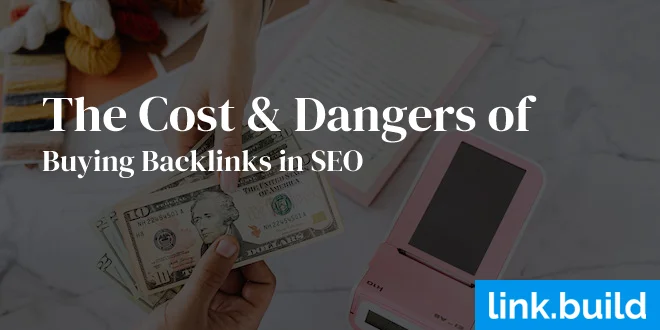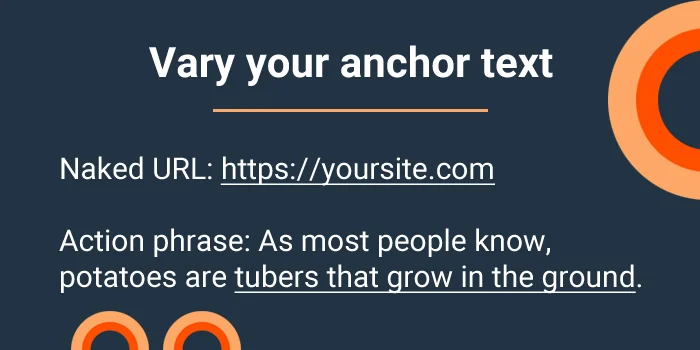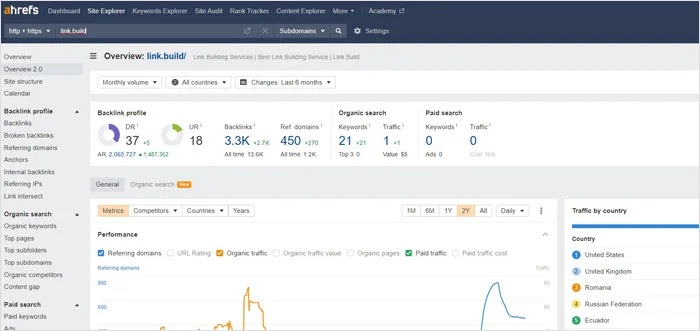The Cost & Dangers of Buying Backlinks in SEO

Generating a strong backlink profile requires a heavy investment of your time and energy, and when it becomes overwhelming, people start buying backlinks.
It’s not hard to find people willing to give you a link in exchange for some cash, but is it worth it?
Are those links any good?
Will you get in trouble with Google?
If you’re serious about your SEO strategy, you should be intentional about where and how you acquire your backlinks.
Spending money to acquire links isn’t always off-limits – it’s a matter of what, specifically you’re paying for, and how you set your link attributes.
You don’t need to know how to do any of this if you outsource your needs.
A legitimate, professional link building agency will know exactly how to get you the best link placements for your money.
However, if you’re doing your own link building, or you’re just curious about the details, here’s the breakdown on the true cost and dangers of buying backlinks in SEO.
Why buying backlinks is attractive
Generating a large number of backlinks naturally is hard work because you have to create quality content so enticing that thousands of people will link to your content on their own. Even websites that achieve this goal still buy quality backlinks because it takes a large quantity of backlinks to compete in many search engine.
Another reason people buy backlinks is because many publishers simply won’t allow you to place a link in content they publish without charging a fee. They know the value of backlinks and they want compensation.
Sometimes, it’s easier to buy a bunch of backlinks than it is to haggle with individual publishers to get link placements one at a time. That convenience comes at a price.
What you risk when buying backlinks
The bottom line is that when you buy backlinks, you risk having your entire website blacklisted from Google’s search results. Doing this is considered a link scheme, and if you’re caught, one of two things will happen – your links will be ignored by Google’s algorithm, or you’ll receive a penalty that excludes some or all of your web pages from showing up in search results.
The long-term risk is that if you get caught, all the money you spent on backlinks will have been wasted. You’ll also need to recreate your website on a new domain name if you get banned from Google’s SERPs. If this happens, all the Search Engine Optimization (SEO) results you’ve achieved will be for naught and you’ll have to start over from scratch.
Although paid backlinks pose a serious risk to your website, that doesn’t apply to all paid links. As discussed below in more detail, some paid backlinks are allowed when properly qualified.
What does it cost to acquire backlinks?
The quality of a backlink determines the cost. You could pay $20 for a few thousand poor or low quality links, or you might pay $1,000 for one high-quality placement.
The disappointing truth is that buying links in bulk for cheap is not going to help your search engine rankings and these types of packages are worthless. Serious marketers and SEOs never do this. Instead, they employ an intentional strategy that consists of a couple methods:
- Asking the website owner to add their link to an existing piece of content for a fee. This is called a “niche edits.”
- Paying various websites to publish guest posts that contain a backlink to your site.
To get a niche edit, you can expect to pay a few hundred dollars on average, but it depends on your industry and the quality of content you wish to link. Your cost will also vary based on the Domain Rating (DR) of the publisher. A higher DR will command a higher fee.
It’s much cheaper to go with paid guest posts to build cheap backlinks. Usually, you can get these for under $100. However, publishers that pay for guest post tend to have a lower DR and on top of that, you’ll need to create your content and have it approved.
Safe link building methods
Since backlinks are the bread-and-butter of higher search engine ranking, it makes sense that they would be costly and time-consuming to obtain. Still, many people are willing to pay good money for a mass of build links that help them rank better in Google and other search engines.
Having a large link building budget is great, but you need to acquire your backlinks in legitimate ways to safeguard yourself against potential penalties. Here are some of the safest ways to build your link empire.
1. Vary your anchor text

Google views exact match keyword anchor text as link spam, so try to avoid solely using your main keywords as your anchor text. Vary it up by using naked URLs and action phrases that contain a keyword or two, but are more of a complete thought. For example:
Naked URL: https://yoursite.com
Action phrase: As most people know, potatoes are tubers that grow in the ground.
Make use of LSI keywords when choosing your anchor text by inserting them into the same sentence as your link and the surrounding content. This will help Search engines pick up on the context of your backlinks.
Also, be sure to include a large percentage of links that go to your homepage because that’s part of what makes search engines view your backlink profile as natural.
2. Qualify your backlinks
Paid links aren’t against Google’s terms, provided they’re qualified properly so as not to pass PageRank. Google understands that buying and selling links is part of the digital advertising economy, and it’s not a policy violation to have paid links. They just need to be qualified with the right attributes.
Whenever possible, make sure publishers qualify your paid backlinks with the rel=“nofollow” or rel=“sponsored” attribute within the anchor text tag. For example:
<a href=“https://www.yoursite.com” rel=”sponsored”>Anchor Text</a>
<a href=“https://www.yoursite.com” rel=”nofollow”>Anchor Text</a>
The sponsored attribute is an evolution of nofollow, but has yet to become the standard. Currently, it’s okay to use either because both options will suppress link equity, which satisfies Google’s requirements for paid links.
If you’re going to place backlinks in discussion forum signatures, comments, or blog post, you’ll want to use the rel=“ugc” attribute.
When to apply the sponsored attribute
Any link that is an advertisement, paid placement, or was compensated (including affiliate links) should be qualified as sponsored. However, unless you’re publishing your own links, you won’t be able to apply the attribute. You’ll need to rely on your publisher for this.
If the publishers you buy links from won’t qualify your backlinks, you may want to think twice about purchasing links from them to protect yourself from getting hit with a penalty. A couple of unqualified links will probably fly under the radar, but a handful or more may not.
Paid, qualified links still have value
You might be wondering if link scheme buying that gets labeled as sponsored is worth it if they aren’t going to pass PageRank. While these links won’t help you rank, they will help you build authority in your niche and generate targeted traffic to your website.
3. Create naturally enticing content
Having content that people want to link is an excellent way to generate backlinks without any effort or expense. The way to do this is simple, but not easy. You need to create authoritative content that people will naturally view as a valuable resource, and will therefore link in their content on their own. This requires being somewhat of an expert in your niche and no matter what you’ve read, you can’t become a true expert in a short period of time.
If you’re not able to create high-quality, authoritative content, then hire an expert to do it for you. Or, consult with an expert to get as much insight and information as possible so you can write your own content.
Once your website becomes a respected, reliable resource in your niche, many people will link to your content automatically. As this happens, your authority will grow and so will your search rankings.
4. Conduct link outreach
Another way to get high quality backlinks is to reach out to site owners to see if they’ll give you a high quality links placement on their website. Although, you don’t want to reach out to everyone. Here are some tips for successfully engaging in link outreach.
Is the website presentable?
Many websites get tossed up online just to take up space and sell links to bad link building companies. Avoid these sites completely. There’s an easy way to spot these because they usually look spammy, scammy, or they’re poorly designed. The most common signs include a poor design, a lack of quality images, overuse of stock photos that don’t really match the content, vague or absent author bios, and logos that look like clip art.
If you wouldn’t stick around to browse the site for more information, it’s not worth trying to get a link.
Does it get organic search traffic?

Google and other search engines like sites that generate organic search traffic because it indicates the content is valuable. To find out what kind of traffic a site gets, head over to Ahref’s Site Explorer, type in the domain name, and click on “Overview.”
Check to see that the site generates a decent amount of search traffic. Then, click on “Performance” to view the site’s traffic over time. If the numbers show a steep decline, it was likely hit by a major algorithm update and links from this type of site won’t be useful.
Is the site known to sell links?
Websites that sell links are just a moment’s notice away from getting a Google penalty. If you acquire backlinks from these types of sites, you risk losing everything when that ax comes down.
Browse through a site’s blog to review anchor text and see if anything looks spammy or unnatural. For example, exact match anchors that lead to commercial websites are a key indicator that the site sells links.
Is the site known to buy links?
Getting backlinks from a website that buys links is risky because if they get penalized, you’ll lose your links. Just because they haven’t been caught yet doesn’t mean it won’t happen.
Run each potential publisher through Ahref’s Site Explorer to identify followed links with suspicious anchor text. If the site has a bunch of anchor text that is an exact match to basic keywords, it’s a sign that those links have been purchased. While many people get away with this, you never know when Google will intervene. Avoid pursuing links from these sites – it’s too risky.
Is your link proposition useful?
Website owners aren’t likely to publish your link unless it provides genuine value to their audience. If the content you want to link is general in nature, consider updating your page to give it more depth before pitching any link requests.
You may struggle to get your link placed on websites that already have similar content, so be intentional when you reach out. Target sites that don’t already cover that particular topic or angle.
Don’t risk losing your SEO progress
Buying backlinks is a risky endeavor and isn’t worth the potential consequences. If you want to buy links to generate traffic, and you’re okay with the “sponsored” or “nofollow” attribute that won’t pass PageRank, then buy all the links you feel are appropriate. However, skip the spammy sites with spammy links and too-good-to-be-true paid link packages. If you rely on web traffic for business revenue, you can’t afford to have your Google rankings drop because you purchased bad external links.


.svg)


.jpg)
.jpg)